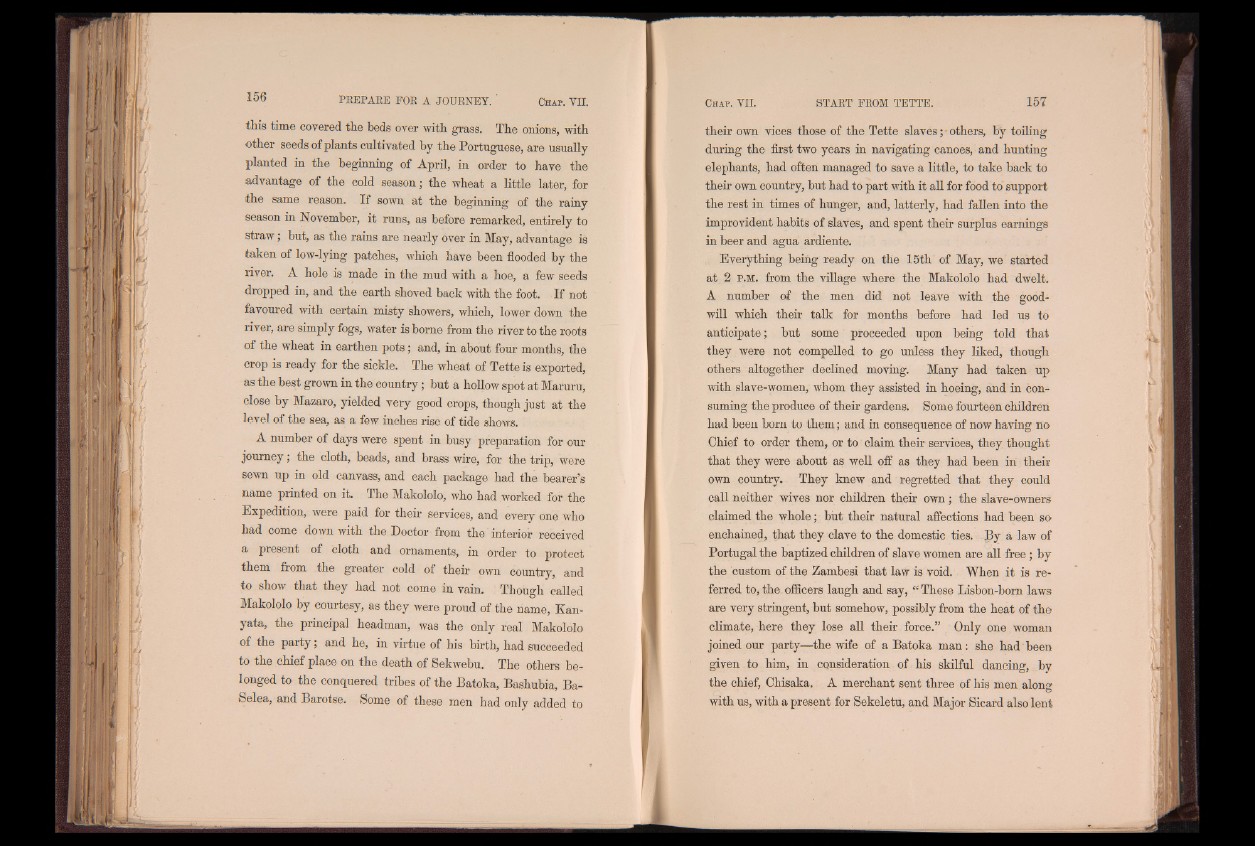
this time covered the beds over with grass. The onions, with
other seeds of plants cultivated by the Portuguese, are usually
planted in the beginning of April, in order to have the
advantage of the cold season; the wheat a little later, for
the same reason. If sown at the beginning of the rainy
season in November, it runs, as before remarked, entirely to
straw; but, as the rains are nearly over in May, advantage is
taken of low-lying patches, which have been flooded by the
river. A hole is made in the mud with a hoe, a few seeds
dropped in, and the earth shoved back with the foot. If not
favoured with certain misty showers, which, lower down the
river, are simply fogs, water is borne from the river to the roots
of the wheat in earthen pots; and, in about four months, the
crop is ready for the sickle. The wheat of Tetteis exported,
as the best grown in the country; but a hollow spot at Maruru,
close by Mazaro, yielded very good crops, though just at the
level of the sea, as a few inches rise of tide shows.
A number of days were spent in busy preparation for our
journey; the cloth, beads, and brass wire, for the trip, were
sewn up in old canvass, and each package had the bearer’s
name printed on it. The Makololo, who had worked for the
Expedition, were paid for their services, and every one who
had come down with the Doctor from the interior received
a present of cloth and ornaments, in order to protect
them from the greater cold of their own country, and
to show that they had not come in vain. Though called
Makololo by courtesy, as they were proud of the name, Kan-
yata, the principal headman, was the only real Makololo
of the party; and he, in virtue of his birth, had succeeded
to the chief place on the death of Sekwebu. The others belonged
to the conquered tribes of the Batoka, Bashubia, Ba-
Selea, and Barotse. Some of these men had only added to
their own vices those of the Tette slaves; others, by toiling
during the first two years in navigating canoes, and hunting
elephants, had often managed to save a little, to take back to
their own country, but had to part with it all for food to support
the rest in times of hunger, and, latterly, had fallen into the
improvident habits of slaves, and spent their surplus earnings
in beer and agua ardiente.
Everything being ready on the 15th of May, we started
at 2 p .m. from the village where the Makololo had dwelt.
A number of the men did not leave with the goodwill
which their talk for months before had led us to
anticipate; but some proceeded upon being told that
they were not compelled to go unless they liked, though
others altogether declined moving. Many had taken up
with slave-women, whom they assisted in hoeing, and in consuming
the produce of their gardens. Some fourteen children
had been born to them; and in consequence of now having no
Chief to order them, or to claim their services, they thought
that they were about as well off as they had been in their
own country. They knew and regretted that they could
call neither wives nor children their own; the slave-owners
claimed the whole; but their natural affections had been so
enchained, that they clave to the domestic ties. By a law of
Portugal the baptized children of slave women are all free; by
the custom of the Zambesi that law is void. When it is referred
to, the officers laugh and say, “ These Lisbon-born laws
are very stringent, but somehow, possibly from the heat of the
climate, here they lose all their force.” Only one woman
joined our party—the wife of a Batoka man: she had been
given to him, in consideration of his skilful dancing, by
the chief, Chisaka. A merchant sent three of his men alone
with us, with a present for Sekeletu, and Major Sicard also lent